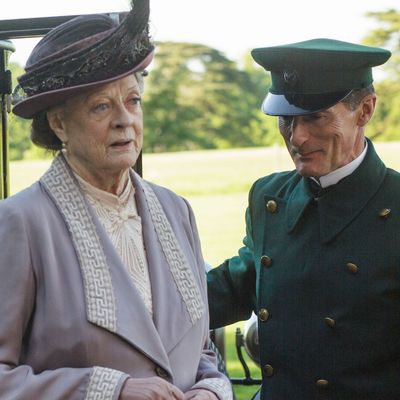
In this week’s episode, the doors to Downton Abbey are flung open to the public for the first time, allowing the Downton equivalent of all the Whos down in Whoville to roam about the place (for a small charitable fee) and see how the other half lives.
Nevertheless, Robert and the Dowager Countess are all, “I don’t get why anyone would want to see our family home. Doesn’t everyone live in a manor that’s roughly 187,289 square feet and populated by tuxedo servants?” (Actually, Robert’s exact, wildly inappropriate questions are: “What on Earth can we show them to make it worth their money? Lady Grantham knitting? Lady Mary in the bath?” At which point, Carson looks at him like, “Man, I kinda miss it when this guy didn’t talk and just spewed blood out of his mouth.”)
This week, Edith also welcomes Bertie to Downton with open arms. If she’s already bringing him home to meet the parents and the child she had out of wedlock, their relationship must be getting pretty serious. Meanwhile, Mary happily welcomes Henry Talbot into her mouth during a trip to London, in the middle of a sudden rain storm ripped straight out of a John Cusack movie. I can’t blame her — any heterosexual woman, even the kind burdened by grave concerns about “marrying down,” would probably be inclined to throw all Gatsby-esque-headband caution to the wind when faced with the prospect of some lip-on-lip action with Matthew Goode, who is at his charming-romantic-interest mostest this week. (Did you notice how he giggled after Henry accidentally implied Mary might be his wife? Did you GIF the giggle? If so, can you send it to me?)
Yes, the common theme in this, the sixth episode of Downton Abbey’s final season, is the breaking down of barriers. It happens between the villagers and the inside of Downton; between Crawley sisters and their respective beaus; between Isobel and Lord Merton, courtesy of the very nice woman who (for reasons that defy logic) plans to marry Lord Merton’s utterly despicable son, Larry; between Miss Baxter and Peter Coyle, the former paramour/criminal mastermind who, now jailed, is writing her letters that don’t sit well with Molesley; between Molesley and the opportunity to, potentially, shift his career into the classroom; and between Mr. Mason and Mrs. Patmore, upon whom Mr. Mason is repeatedly swiping right, despite Daisy’s objections.
Naturally, walls don’t come down for all. Anyone who represents the old-school way of doing things winds up hitting a brick wall in this episode — like the Dowager Countess, who’s overthrown from her role as hospital president by way of a coup d’Cora, or Mary, who can’t get a single person to cave to her traditionally devious methods of confirming that Marigold is Edith’s daughter. That includes poor Thomas the under-butler, who Carson describes as “fragrant with memories of the lost world.” And yes, he utters that phrase with zero sense of self-awareness. (If Carson existed in cologne form, he would literally be called “Fragrant With Memories of the Lost World.”) But that doesn’t stop him and Robert from attempting to nudge Thomas out the door and, in Carson’s case, accusing Thomas of illicit activities with Andrew. But all he’s actually trying to do is stamp out illiteracy.
The contrasting scenes at the end of the episode — when Mary says that rumors of Downton’s demise are “weakling talk” and that she and George “are not going anywhere,” followed by the shot of a wounded Thomas, crying alone in the dark — demonstrate that some people in this world have freedom and choice, while others still have none. With four episodes left to go, though, something tells me Thomas might remain standing after all. Molesley’s hinted-at departure to work at the school would certainly allow room for him to stay on-staff, and potentially to remain beside Mary and George after everyone else has long left Downton.
But enough about sad Thomas. Truly, the most telling and compelling story line in this episode — aside from Carson’s rejection of Mrs. Hughes’s cooking, obviously — is the fact that the Crawleys have finally allowed the public inside Downton, at Tom’s and Mary’s suggestion. There have been many metaphors for the crumbling nature of aristocratic life on the series, but this particular one is the most blatant. Downton is being treated like the museum it’s destined to become.
There’s something especially delicious and amusing about watching the family’s complete ineptitude when forced to act as docents. They’re surrounded by the architecture and artifacts of rich history every day, but they’re at a loss to explain the stories behind any of it.
Visitor: Tell us about who is in this painting.
Edith: Yes, well, those are … people. And as you can see, they’ve each got two arms and two legs. They were all rather marvelous and living that life. You know, that life … that people lead … when they have two arms and two legs.
The entire scene is a pitch-perfect definition of privilege, further underlined by the young boy who sneaks into Robert’s bedroom — for those keeping score, that’s the third Downton bedroom that’s been invaded by the lower classes this season — and lectures him on the audacity of living so large.
The other great thing about that sequence is how it simultaneously illustrates that everything within the walls of Downton is neither grand nor perfect. Even at Downton Abbey, mothers-in-law drop by uninvited and go on unwarranted rampages, in the Dowager Countess’s case because she thinks her daughter-in-law has secretly usurped her of all her hospital-supervision powers. (Note to the D.C.: If your power is that easily usurped, you probably did not have that much in the first place.)
Hell hath no fury like a Dame Maggie Smith scorned. Which is proof that every family can be unhappy in its own way, even the seemingly untouchable Crawleys.


